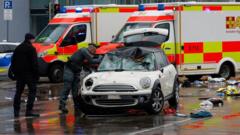The driver, a 24-year-old Afghan asylum seeker identified as Farhad N., was apprehended at the scene of the attack, which occurred Thursday at approximately 10:30 am local time during a transport workers' union rally. Witnesses reported a shocking scene as people scrambled for safety near the Munich main train station when the car veered towards police vehicles and crashed into the assembly. In response, police officers opened fire on the vehicle.
Reports indicate that counter-terrorism units have since taken charge of the investigation given the suspect’s alleged extremist connections. The violent episode unfolds just a week before Germany’s upcoming federal elections and follows a spate of similar assaults that have heightened public concern over immigration policies.
Chancellor Olaf Scholz condemned the attack, stating that the suspect must face punishment and be deported. The incident occurred right before the highly anticipated Munich Security Conference, where world leaders, including Ukrainian President Volodymyr Zelensky and US Vice President JD Vance, were set to convene.
Munich Mayor Dieter Reiter confirmed that among the injured, there were indeed children, intensifying the emotional response to the tragedy. Eyewitnesses described a chaotic scenario where people fled into nearby shops and buildings. One local student exclaimed, “It is obviously very unsettling. I can't concentrate on anything else.”
The suspected attacker arrived in Germany in 2016 as an unaccompanied minor, with his asylum application rejected the following year. Reports suggest that he was supposed to be deported by late 2020 but had not been removed from the country due to safety concerns in Afghanistan, according to Bavarian Interior Minister Joachim Herrmann.
Premier Markus Söder characterized the incident as a "suspected attack" and expressed a pressing need for change in Germany’s immigration policies. He made references to a recent Christmas market attack in Magdeburg, which resulted in multiple casualties, indicating a growing public frustration regarding security.
As law enforcement seeks witnesses and additional information regarding the incident— including unverified claims of a possible accomplice— the political landscape in Germany continues to shift. The topic of immigration is increasingly central to the electoral discussions, particularly concerning rising right-wing sentiment marked by the Alternative for Germany (AfD) party, which stands second in polling.
In addition to this incident, tensions remain high following recent violent acts attributed to immigrants, future trials of Afghan nationals facing serious charges, and an ongoing dialogue around the country's asylum policy, as civil society grapples with the dual challenges of maintaining security while addressing humanitarian commitments.




















